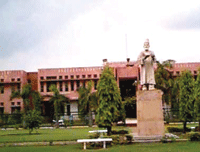Confronted with perhaps the worst image crisis in its history after one of its students was shot dead by the Delhi police on September 19, and another three arrested following the deadly September 13 serial bomb blasts in the national capital which claimed 25 lives and injured 100, the management of the Jamia Millia Islamia (JMI, estb. 1920) — India’s showpiece secular Central university — is pulling out all stops to defend its reputation.
 According to the Delhi police, the deceased JMI student Mohammed Amin Atif was the mastermind behind the Delhi blasts of September 13, and the other JMI students were part of his terrorist ring which played a key role in similar bomb blasts that rocked several cities during the past couple of months. The low credibility of the Delhi police — a recent Transparency International India public opinion poll indicates that the police force countrywide is perceived as India’s most corrupt institution — has prompted JMI’s vice-chancellor Prof. Mushirul Hasan, a highly respected champion and spokesperson of religious secularism, the university administration, faculty and students, to launch an initiative to salvage the showpiece university’s reputation.
According to the Delhi police, the deceased JMI student Mohammed Amin Atif was the mastermind behind the Delhi blasts of September 13, and the other JMI students were part of his terrorist ring which played a key role in similar bomb blasts that rocked several cities during the past couple of months. The low credibility of the Delhi police — a recent Transparency International India public opinion poll indicates that the police force countrywide is perceived as India’s most corrupt institution — has prompted JMI’s vice-chancellor Prof. Mushirul Hasan, a highly respected champion and spokesperson of religious secularism, the university administration, faculty and students, to launch an initiative to salvage the showpiece university’s reputation.
Within hours of the student arrests (during which a policeman, Inspector Mohan Sharma was killed), the university management publicly criticised the Delhi police for “trial by media” and expressed its intent to provide legal aid and counsel to the arrested students. Unsurprisingly, this initiative has received the approval of minorities champion HRD minister Arjun Singh. “There is nothing wrong with providing legal aid. In this case, I have the full details. The decision of the university is in the interest of the nation,” Arjun Singh told reporters after Hasan visited with the minister.
Inevitably JMI’s resolve to provide legal assistance to the accused students hasn’t gone down well with the opposition BJP which demanded dismissal of the vice-chancellor for sanctioning the use of government funds for defending “terrorists”. A party spokesperson described JMI’s decision as “atrocious, anti-national and highly objectionable”.
Despite the Delhi police claiming to have conclusive evidence, JMI’s 11,000-strong community of students and faculty is not impressed by the police version of the September 19 shootout in Delhi’s Muslim ghetto of Jamia Nagar. The dominant belief on the JMI campus is that under pressure to nab perpetrators of the September 13 bomb blasts, the Delhi police randomly targeted Muslim students and were investigating them when the shootout occurred.
They question how two students — according to the police version — escaped from the completely surro-unded building with only one entrance/exit in broad daylight. Moreover in his weekly column in the Sunday Times of India (September 28), one of India’s top current affairs columnists, M.J. Akbar suggests that Inspector Sharma was killed by “friendly fire” of the police rather than of the students in the tiny room.
eanwhile on September 25, the 125-member Academic Council of JMI convened an extraordinary general meeting and constituted a legal aid committee which will work independently of the university administration. “The committee will regularly visit the students held in detention to ensure that they are well treated and not subjected to third degree interrogation. Another four-member students’ relief committee will raise funds from staff and students for financing the legal aid provided to the accused students. JMI teachers have agreed to contribute one day’s salary for this,” says Rakshanda Jalil, media coordinator of the Academic Council.
The JMI management and students’ stand on the issue is endorsed by Praful Bidwai, the well-known Delhi-based columnist. “It is only proper for institutions with secular credentials like JMI to stand up and offer legal representation in the case. In a society where even lawyers shy away from representing people accused in terrorism cases, JMI’s support to the accused students will set a good example of constitutional propriety. In particular it is pertinent to note that in this case the entire JMI community comprising Muslims, Hindus and others have taken up the students’ cause in the belief that everybody has the right of fair trial and justice,” says Bidwai.
Autar Nehru (Delhi)